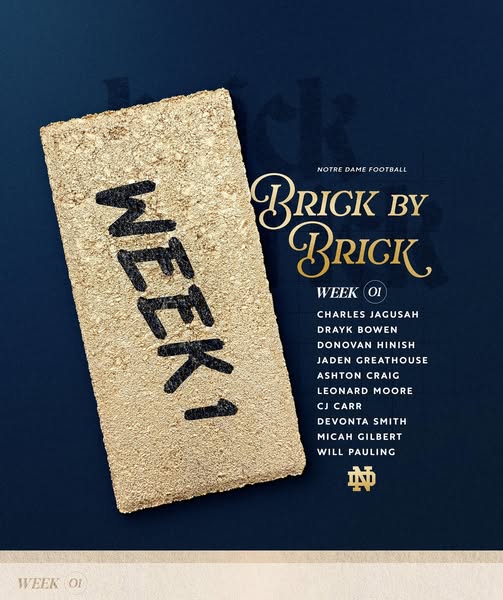Building the foundation of a championship program doesn’t happen overnight. It’s not defined by the touchdowns or the tackles seen on Saturdays in the fall. Instead, it’s forged in the shadows — in early morning weight sessions, grueling sprints, and the smallest, often unnoticed acts of selflessness. For Notre Dame football, the grind is sacred. And in South Bend, the Fighting Irish are turning that grind into something deeply personal, deeply human, and deeply powerful.
Every workout at Notre Dame ends the same way: with a celebration — not of themselves, but of each other. As the sweat still clings to their skin and their breath is heavy from the final rep, players gather for a ritual rooted in gratitude. It’s called “Building the Foundation Brick by Brick,” and it has quickly become one of the most impactful cultural pillars of the program.
After every training session, one player is asked to stand in front of the team and publicly recognize a teammate who pushed them — not just physically, but emotionally and mentally. Someone who set the tone. Someone who showed them what being a Notre Dame man really looks like. It’s not about who lifted the most or ran the fastest. It’s about who led, who inspired, who stayed after to help a younger guy with technique. Who brought energy when everyone else was exhausted. Who chose “team” when it would have been easier to fade into the background.
This is what head coach Marcus Freeman envisioned when he emphasized building culture over simply chasing results. He knew that sustainable success — true greatness — comes from connection. And the daily tradition has already begun to shape something rare within the program: an unshakable brotherhood.
Sophomore linebacker Drayk Bowen remembers the first time he was honored. “It hit me harder than any tackle I’ve ever made,” he says with a smile. “To know that someone saw me grinding, even when I thought no one noticed — that stays with you. And it makes you want to push even harder.”
For Bowen, who came into Notre Dame as a heralded recruit, the adjustment to college football was humbling. The speed of the game, the academic rigor, and the sheer physical demands of playing at one of the most storied programs in the nation tested him in every possible way. But during a brutal conditioning circuit one afternoon, it wasn’t a coach who kept him going — it was senior safety Xavier Watts.
“Xavier just kept yelling, ‘Let’s go, Drayk!’ over and over,” Bowen recalls. “He didn’t have to. He was already done with his reps. But he stayed with me. And when I finished, he high-fived me and told me I belonged here. That changed everything.”
Weeks later, after a punishing leg day, Bowen stood up in front of the team and returned the favor. “Xavier Watts,” he said, voice cracking with emotion. “You made me believe I could do this.”
That’s the point of the ritual — to make sure no one’s effort goes unnoticed, and that every brick laid in the foundation is seen and appreciated. For Freeman, it’s also a teaching tool. It reinforces accountability, trust, and the idea that leadership comes in many forms. Not everyone has to be a vocal alpha. Sometimes, leadership is quiet — a hand on the back, a word in the ear, a moment of presence when it matters most.
Graduate transfer wide receiver Kris Mitchell, who joined the Irish from FIU, says the tradition helped him feel at home immediately. “Coming into a new locker room is always tough,” he explains. “You don’t know how you’ll be received, or if you’ll connect with guys who’ve been together for years. But the first time someone called my name after a workout — man, I felt seen. I felt like I was part of something special.”
Mitchell now makes it a point to encourage the younger receivers, remembering how much that affirmation meant to him. “It’s like a chain,” he says. “Someone picks you up, and then you pick up someone else. Before you know it, everybody’s pulling in the same direction.”
The chain is growing stronger with each workout. And while it’s easy to romanticize the idea, the truth is that the grind isn’t always beautiful. There are mornings when bodies ache and motivation is low. There are setbacks, small injuries, mental blocks, days where nothing feels right. But that’s where the foundation is truly built — in adversity, in repetition, in the decision to show up anyway.
Senior offensive lineman Joe Alt, a captain and All-American, has been honored more times than he can count. But for him, it’s not about ego. “It’s humbling,” Alt says. “Every time someone says your name, it reminds you that your work matters. That your attitude affects other people. It makes you want to carry that standard every day.”
Alt also credits the tradition with transforming how players view each other. “You start to pay attention to things you might’ve overlooked before. Like who stayed late to work on footwork. Who was the last guy to leave the film room. Who encouraged a teammate after a mistake. It sharpens your focus — not just on yourself, but on the team.”
That awareness has real impact. Coaches say the practice has dramatically improved accountability, reducing the need for external discipline and increasing self-policing within position groups. Strength coach Matt Balis, who helps facilitate the post-workout tradition, says it’s one of the most effective tools he’s seen in over two decades of training elite athletes.
“When they know they’re being watched — not judged, but watched with admiration — it changes everything,” Balis explains. “They start to understand that the grind isn’t just a solo pursuit. It’s communal. Every rep you do well raises the bar for someone else.”
The players feel it too. Quarterback CJ Carr, who arrived on campus with plenty of hype, says the tradition is helping him grow into the type of leader he wants to be. “I’m learning to lead with gratitude,” Carr says. “It’s easy to talk about yourself and your goals. But when you take time to recognize someone else — to shine the light on them — that’s where trust is built. And trust is what wins games.”
For Carr, his first time being recognized came from running back Jeremiyah Love, who praised his attention to detail during a film session. “I didn’t even realize he noticed that,” Carr says. “It made me want to keep doing the little things right, because it showed me those things matter.”
In a world where social media often rewards flash over substance, Notre Dame’s tradition is a defiant return to substance. It teaches players to value effort over clout, to invest in each other instead of chasing individual recognition. And in doing so, it’s laying the kind of foundation that lasts far beyond football.
As the Irish prepare for another season filled with high expectations, the ritual continues. Brick by brick, rep by rep, moment by moment, they are constructing something greater than wins and trophies. They are building identity. They are building culture. And more than anything, they are building each other.
In the dimly lit weight room, with music still pulsing in the background and sweat pouring off their faces, players gather again. A hand goes up. Another name is spoken. A nod of respect. A fist bump. A clap. The foundation grows stronger.
Brick by brick. Always.



